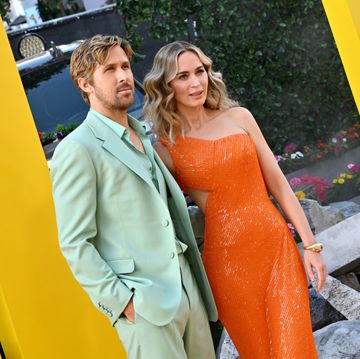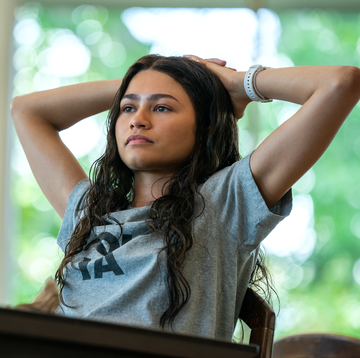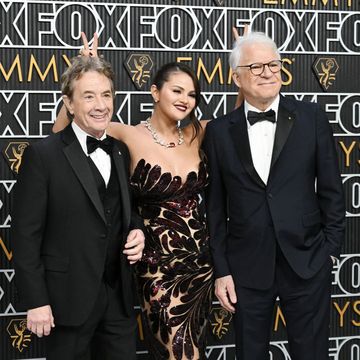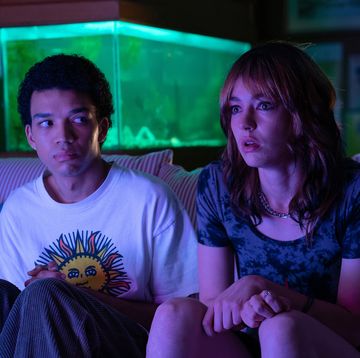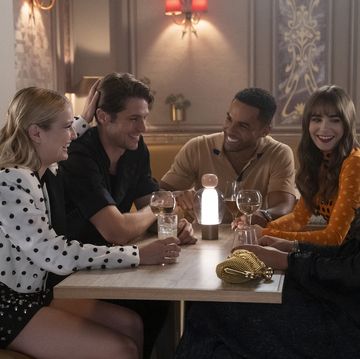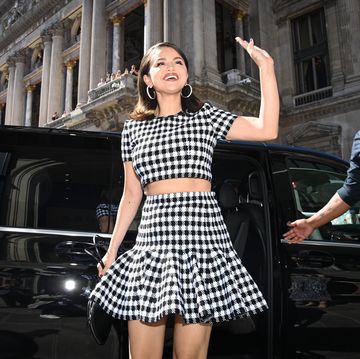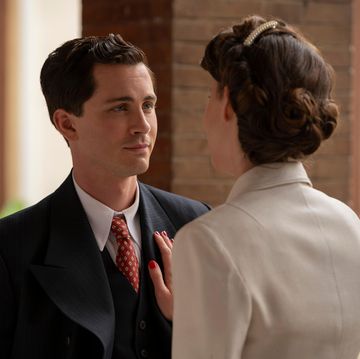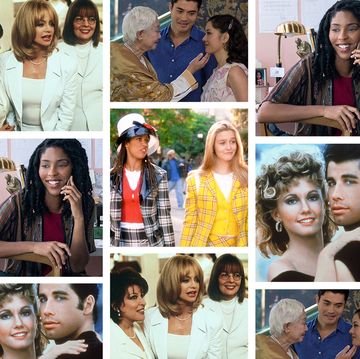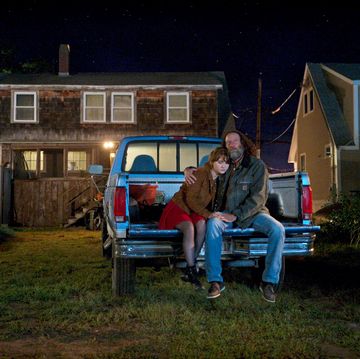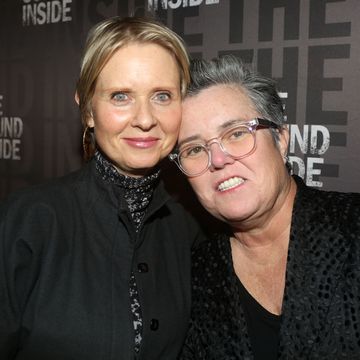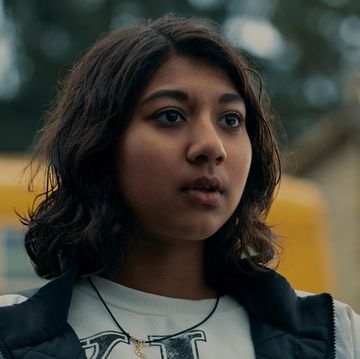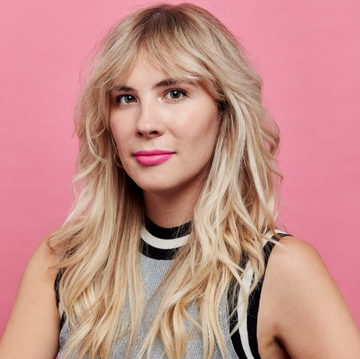What do you wear to attend a fashion show in Karachi, Pakistan? It's one of many questions model and actress Hailey Gates encounters as host of Viceland's new show States of Undress. Gates spent a year traveling to places like Venezuela, the Congo, China, Russia, and beyond to unpack fashion and beauty traditions and the way they reflect each country's views on gender, race, religion, economics, and politics. "My expectations were totally shattered immediately upon arriving," she says of her time in Pakistan. The culture shock is all documented in the first episode, in which she meets a transgender hair stylist, an Islamic leader who believed women in revealing clothing led to "destruction," survivors of acid attacks, and designers creating bondage-inspired clothing, among other characters.
Gates' willingness to jump head-first into fish-out-of-water experiences and relate to her subjects, no matter how disparate her views are from theirs, makes for gripping television. "Just being able to put [the show] out in the world is really exciting," she says. "Since we put out the Pakistan episode, I've had a number of Pakistani girls write to me and tell me how thrilled they were to see their country portrayed in a way that they had never seen before. I don't know what's better than that."
Here, Gates breaks down some more standout observations she made while trekking the globe.
What was one eye-opening moment you've had while learning about different countries' beauty traditions?
Venezuela was really interesting to me. It's a really intense time there. It's extremely dangerous and the country is suffering from this kind of [Hugo] Chávez hangover, but there is some notion that, because you can't control your government that the one thing that you can control is your appearance and your body. I was just struck by how willing people were to change themselves.
There's a lot of plastic surgery that goes on there. It's a totally different concept than what we [Americans] have. It's like, if I wake up in the morning and I look in the mirror and I think, 'Fuck, well, you look like shit,' I would put on a big coat and hope for the best. There, people look in the mirror and they think 'I can fix that.' There's a very different mentality associated with plastic surgery there: it's not looked down upon. It can be a [form of] social mobility and a symbol of power. For women who own businesses or have high-powered jobs, it's actually more likely that they'll look extremely feminine and have plastic surgery than this American unsex-yourself-dress in-a-suit-in-order-to-be-taken-seriously concept. Sexuality is paramount with power and success.
The Congo episode comes out tomorrow–what did you learn there?
The Congo is so fun. The ideal body type coveted by women in the Congo is this extremely curvaceous body. They're going through a number of extreme measures to get that kind of body form and one of them is by using bouillon cubes. They mix it with water and inject it into their butt with the hopes of making it bigger. In the Congo I also really like this fabric they use called the pagne. They basically make the dress, shoes, and all accessories in the same fabric, which I think is super chic.
In which country did you find yourself most shocked by practices?
The last episode happens in China and I have to say, I was very surprised by how censored everything is there. The Internet, even fashion designers [are censored] in terms of creativity. It's really incredibly shocking.
Has your perspective on American fashion changed in this experience at all?
I think we're all very casual in comparison. Everywhere else people take more pride in the way they look and feel.
What was the most challenging part of filming?
Just being comfortable on camera. And peeing, honestly. I've peed in some very weird places: off the side of the road, in a hole, you name it. I keep making jokes that I'm going to get a catheter for the second season. It's just, I'm so curious and I want to be working constantly. I want to be filming everything when we're on the road and peeing has become such an inconvenience. It's been pretty funny.
Surely you encountered a lot of culture clashes–any funny stories from that?
Oh my god, too many to count. I'm constantly trying not to touch people. I guess I didn't really realize I was so friendly in that way until I started going to Muslim countries because there were definitely moments where my producer was like whacking me with a stick like, "What are you doing? Don't touch people!"
In most of these countries, I don't speak the language and so there's often like a lag time between when I say something and when they hear something and vice versa, which can be very hilarious. In China, because Chinese is a tonal language, it can be kind of hard to follow people's emotional tracks. There was one moment where a woman I was interviewing just sort of burst into tears and I can usually sort of tell when things are coming on and in that moment it was very unexpected.
In the first episode, one really shocking interview was with a man who committed an acid attack on his wife. Were those the kinds of stories you were trying to find while making 'States of Undress'?
The reason I decided to take on this journey was because of stories like that. Initially, to be honest, I didn't know whether fashion would lend itself to exploring all the avenues that we wanted to explore in these countries. It turned out that it really did. The point of this show is to use fashion as an entry point to talk about identity issues and politics and sort of underreported cultural phenomenon and to be able to show both the light and the dark of these things.
It seems like everyone you interview–from locals to leaders–are really receptive to you. Did you ever have a difficult time?
I met with Vitaly Milonov who's a lawmaker in Russia and sort of a notorious homophobe. I talked to him about Russia's #realfamily campaign. When gay rights was legalized here [in the U.S.], Russia came out with a straight pride flag [and hashtagged it #realfamily] and there was this sort of intense pressure on women in Russia to marry and have children. So, I went to speak to him about that and he was... I think he was used to people talking to him about how awful his ideas on gay rights are so he was really on the offensive the whole time. So he was pretty difficult. There were [also] moments in China where my translator didn't want to translate certain questions that I asked.
What would you say is the biggest lesson you've learned about fashion's function in society?
Everybody gets dressed every day and whatever you decide to get dressed in that morning is communicating something. Whether that's helping you sort of form your identity or telling people how they should deal with you, it's all information. Some of us are lucky enough to choose what we wear, and some of us don't have that luxury, but we all are communicating something to the world around us by what we wear no matter if it's sweatpants or a tuxedo.
'States of Undress' airs on VICELAND Wednesdays at 10 p.m. ET






